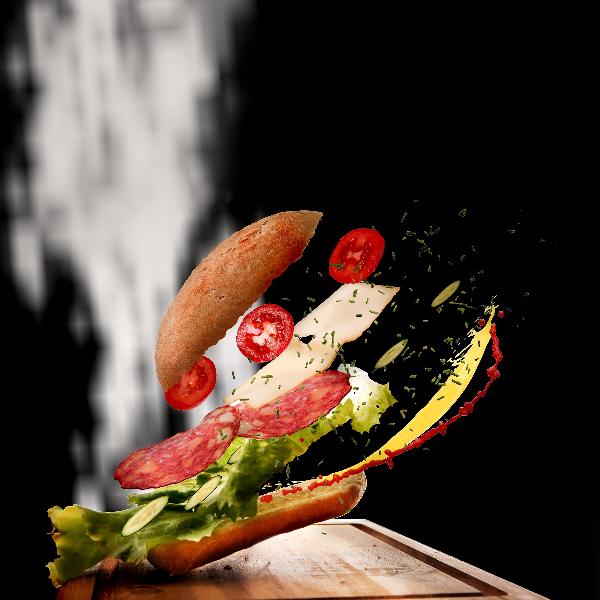
A new report from Bord Bia forecasts the Irish foodservice market will return to prepandemic levels by the end of 2022.
The Irish foodservice market is set to grow this year, although prolonged lockdown has resulted in a slower than anticipated recovery, according to a new report launched by Bord Bia.
The report predicts that the Irish foodservice market will grow by 11% on last year to reach almost €5 billion by year end, with an additional 56% (€2.8
billion) growth predicted for 2022. Last year, following eight years of consecutive growth, the foodservice market fell by a stark 47% (from €8.5 billion to €4.5 billion) and Bord Bia believes it will be the end of 2022 before the majority of the industry could return to close to the prepandemic levels of trade.
Previous Bord Bia reporting on the impact of Covid-19 provided preliminary forecasts for the Irish foodservice industry’s recovery in 2021,
but the ongoing restrictions have been more longstanding and impactful than originally estimated. In response to the ongoing impact of Covid-19 on Ireland’s foodservice industry and the knock-on effect on Irish food and drink producers, Bord Bia has published revised outlooks and a new report charting growth forecasts for the remainder of 2021 and into 2022, as the industry moves towards a full reopening from early July onwards.
The ‘Outlook on the Irish Foodservice Industry Post-Pandemic’ report, co-authored by global foodservice research specialists Technomic, has been developed to equip the industry, and Irish food and drink suppliers servicing this market, with up-to-date data and insights as they plan for the period ahead and includes key trends and recommendations for businesses across the sector.
Resilience in the face of lockdown
“Our end of year Market Insights report published in November 2020 documented the huge hit that the industry had taken as a result of Covid-19,” explained Maureen Gahan, Foodservice Specialist, Bord Bia and report co-author. “At that stage, we estimated that even in a worst case scenario, 2021 would see growth rates of 16%. However, we had not anticipated the length nor depth of the lockdown that was to follow. This has resulted in a lowering of the overall expectation for growth in 2021 to 11%, lower than the ‘worst case scenario’ laid out late last year.
“That being said, foodservice in Ireland has displayed resilience in the face of the most prolonged shutdown in modern memory. The industry has shown adaptability, perseverance and tenacity to survive, and with the assumption that the worst part of the crisis has passed, will begin to emerge and grow again in 2021 and beyond,” Maureen continued.
“We are forecasting a strong second half to 2021 as the vaccine roll-out continues at pace, coupled with pent-up demand and consumer savings and we remain confident on the longer-term viability and resurgence of the industry. As the economy recovers and consumers grow more confident living in the age of Covid-19, this will see a parallel recovery in the Irish foodservice market.”
Key trends and recommendations
In the face of this outlook, the latest Bord Bia report outlines trends and recommendations for businesses as they forward plan and adapt their positioning, products and services, including:
• Taste will continue to be the most important driver for consumers, and crave-ability should be a focus for product innovation and menu design;
• Continued elevated growth in off premise: even as dine-in reopens, there will be a need for offerings that can easily transition from on premise
to off-premise occasions and provide a great experience;
• Need for skilled labour: this was a concern pre Covid-19, now further exacerbated due to job uncertainty experienced by many during the
pandemic. Labour saving solutions will continue to be sought after by foodservice operators;
• Safety, including items that offer a lower touch/contactless experience, will continue to be important. Technology developed now will
remain, and new products will evolve accordingly.
Prolonged and significant changes
David Henkes, Senior Principal, Technomic, and report co-author, believes that Ireland’s foodservice industry, and the Irish food and drink suppliers servicing this market, are facing prolonged and significant changes due to the global pandemic, and many of these shifts will be permanent.
“This report highlights the key trends that have been identified and/or accelerated over the past 12-14 months,” David noted. “For example, with the strong demand for off-premise food (including delivery, takeaway and drive-thru), restaurant models are adapting to accommodate what is widely expected to be elevated demand, even as the pandemic ends. Seating areas are being re-thought, with more outdoor
space being added. For some quickserve restaurants, dining areas are being reduced in size or eliminated altogether.”
Meanwhile, technology has been a key enabler for restaurant and foodservice operator survival and success during the pandemic, David
reveals, noting that, “Further investment in this space will move forward at an accelerated pace, while the importance of sustainability, particularly in packaging, but also in food waste, local sourcing and other critical areas, is expected to return and accelerate. Many of these changes are here to stay and we would encourage all foodservice operators and suppliers to remain informed, and use these insights to refocus and reboot the foodservice
aspect of their business in order to best service their customers as the market reopens.”
Looking ahead
Bord Bia offers a range of bespoke supports and services for foodservice operators and the Irish food and drink companies who supply the market.
Some of the upcoming activities include a virtual Meet the Buyer event taking place at the end of September and the annual end-of-year foodservice seminar, taking place in early December. A full 2021 Irish Foodservice Market Report will be published in December, with plans to include a section on consumer insights and changing customer behaviours as a result of Covid-19.
